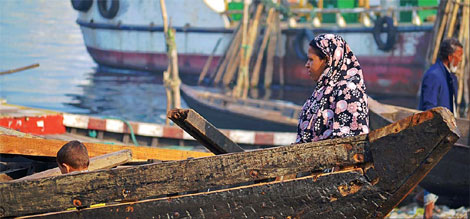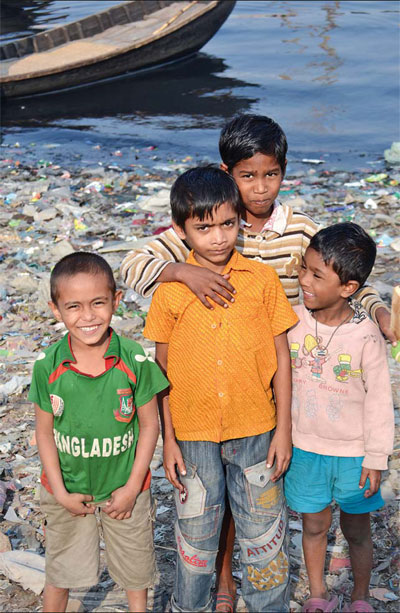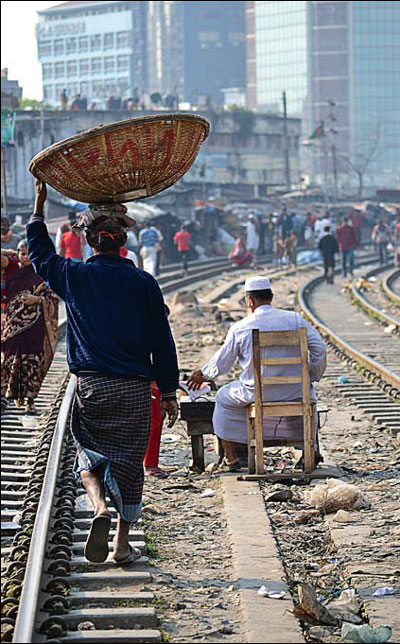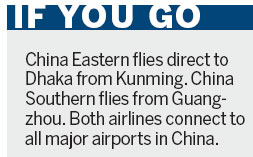'Come before the tourists do'
Updated: 2012-03-04 07:51
By Lee Hannon (China Daily)
|
||||||||
|
Visitors can take a long boat adventure to Khulna and the Sundarbans. |
|
Kids scavenge through the rubbish that piles high along the shore. [Photos by Todd Balazovic / China Daily] |
|
The rail lines that crisscross the city from north to south are also home to tens of thousands of people who live alongside the tracks. |
It has floods, typhoons and poverty, but it also has energy and history. Lee Hannon visits Bangladesh, and is surprised by what it has to offer.
Most people responded with a mixture of perplexity and bewilderment when I told them where I was going next. Some questioned my sanity. Others simply listed an inventory of personal belongings to bequeath them should I fail to return.
Bangladesh is a place left out of most glossy travel brochures and advertisements in the windows of package tour agencies. Even the motto of the National Tourist Office attests, "Come before the tourists do."
The lack of the backpacking brigade is just one of the many hidden beauties of this untapped treasure that for most conjures up images of floods, cyclones and shocking poverty. But for the highly adventurous traveler with a craving for a vivacious mix of history and culture, Bangladesh is the place for you.
Bordered by Myanmar to the south, the Bay of Bengal, and India to the west, Bangladesh sits in the northeast of the Indian subcontinent. China Eastern and China Southern offer direct flights to the capital, Dhaka, from Kunming and Guangzhou respectively, with connections to all major airports across China.
We arrived in the capital amid testing times. Just hours before our flight the army announced they had foiled an attempted coup to overthrow the government, and a major crackdown on Islamic fundamentalism was underway.
It was also a national holiday, and Bangladesh was hosting the world's second-largest gathering of Muslims after the haj to celebrate Biswa Ijtema.
At the best of times, Dhaka is a frenzied city that lives on its wits and thrives on a life that revolves around the water and railways.
Two-thirds of the country floods each year, and at least 157 million people - the world's seventh-largest population - crowd into the remaining residual dry ground in a country roughly the size of the US state of Iowa.
Arriving at Zia International Airport is like an exaggerated existence you see only in movies.
Hundreds of men, most dressed in traditional Islamic salwar kameez, trample across the baggage carousel desperately trying to identify their belongings amid a myriad identically wrapped plastic bundles tied together by rope.
It is a scene of utter chaos, but nothing compared to the roller-coaster ride of activity that waits outside the airport terminal. First it is time to exchange some money, and the arrival terminal is known to offer a much better rate than most hotels in the country: 100 Bangladeshi taka equal about 7 yuan (just over $1).
In rush hour Dhaka will test the nerves of the most enlightened traveler.
The gridlocked city is a cacophony of honking car horns, marvelously chaotic, as brightly colored rickshaws jostle for pole position in an intensity of color and noise that is almost overwhelming.
Luckily, most hotels in the city are within an hour's reach of the airport, even during the busiest times. The scenery is mesmerizing enough to pass the time.
The hustle and bustle of daily life, mixed with the smells, sights and sounds almost anesthetized you to the constant army of children, frail and disabled, who beg at car doors to help feed their families.
The choice of decent available places to stay is limited but growing as rapidly as the population and the number of visitors. Cranes and building sites dot the skyline in every direction.
The Westin is a well-established brand in the heart of the Gulshan diplomatic area, close to all the embassies and well-protected by security with a beautiful Italian restaurant, Prego, overlooking the city on the 23rd floor.
But the Pan Pacific Sonargaon in the heart of the city offers a lot more character and is one of the two oldest five-star hotels in Bangladesh at a much more reasonable rate.
Comfy rooms with plasma TV screens, friendly staff, international restaurants, fitness center and a stunning outdoor swimming pool all make for a perfect combination.
The area surrounding the hotel is a hub of activity and reminds you what makes this city so electrifying to witness.
Bangladeshis have to be one of the most friendly, genial people in Asia. Their curiosity is endless, and even a brief trip into a local barber can attract an audience of dozens.
The Karwan Bazaar is full of life and rich in colors as people sell their wares from fine silk to onions from India under dimly lit lamps. The outdoor market is open all night, and most people work long shifts, taking a brief nap in the shabby tin huts along the rail line they call home.
The rail lines that crisscross the city from north to south are also home to tens of thousands of people who live along the tracks. Some even have tiny stalls in between the two tracks as huge trains hurtle past with hundreds of people sitting, some standing, on the roofs of the carriages.
The best way to get around the city is by CNG - a motorized caged rickshaw - it feels similar to getting on an old Rock-O-Plane amusement park ride.
Shaped liked a Ferris wheel, it has egg-shaped cages that spin 360 degrees as the wheel turns. The nail-biting experience of the CNG, for which you should never pay more than 300 takas (21 yuan), also leaves you feeling as woozy as the carnival ride.
|
|
We head to Sadar Ghat in the heart of the old town and the main ferry terminal for those wanting to take a long boat adventure to Khulna and the Sundarbans - Asia's wetlands and jungle and home of the Bengal tiger.
Or head south to the bustling port of Chittagong and the world's longest beach in Cox's Bazar.
But be warned: "deck class" is exactly as the name suggests. You sleep on deck, often for 20-plus hours and it's BYOB. The final B meaning bedding, because in a Muslim country, alcohol is strictly controlled, though available in some hotels and a few bars.
The ferry terminal is buzzing with activity. Giant ferries jostle to dock amid a blast of horns and klaxons as diesel fumes billow into the sky.
The constant noise of the ships, vendors and stevedores is briefly masked by the muezzins from the mosques that blast out the call to prayer everywhere across the city five times a day.
We board a small Venetian-like punt to take us across the Buriganga River to offer a panorama of the frenetic dock. As we drifted lazily across the river, dodging the cargo ships and ferries that rule this shipping lane, we arrived on the dockyard on the other side.
This is where the world sends its broken ships to be repaired from the forces of Mother Nature.
Blackened sterns, holes, rusted rigging, all torn apart and rebuilt, welded, repainted and sent back into the sea to transport the world's goods.
Some 25,000 people work and live in the slums of the dockyard. Kids compete with the seagulls to scavenge through the rubbish that piles high on the shore. Others work in small tin hut factories making casts for rudders or weaving material for rope.
We decide to head back to port in Old Dhaka following the wise advice that the area is not safe for badeshis (foreigners) in the evening. Most people in Dhaka will say it is better not to be outdoors late in the evening. We leave the melee as the setting sun offers a silhouette of the boats clamoring for space.
The city has a lot to offer the adventurous traveler, and it's also a bargain hunter's dream. A quick look at the labels of most high street brand names will reveal most are made in Bangladesh's thriving textile industry.
Bongo Bazaar and New Market are the two places to find the genuine articles.
I managed to pick a whole new suitcase full of brand names that would normally cost around $8,000 back home. I paid less than 1,000 yuan for the lot, including the suitcase to carry home my new wardrobe.
Bangladesh has something for everyone with the verve to savor a different part of Asia. It is a stunning country, with the warmest people, born out of a nightmare of war they hope will turn into a dream.
You may contact the writer at leehannon@chinadaily.com.cn.

 'Taken 2' grabs movie box office crown
'Taken 2' grabs movie box office crown
 Rihanna's 'Diamonds' tops UK pop chart
Rihanna's 'Diamonds' tops UK pop chart
 Fans get look at vintage Rolling Stones
Fans get look at vintage Rolling Stones
 Celebrities attend Power of Women event
Celebrities attend Power of Women event
 Ang Lee breaks 'every rule' to make unlikely new Life of Pi film
Ang Lee breaks 'every rule' to make unlikely new Life of Pi film
 Rihanna almost thrown out of nightclub
Rihanna almost thrown out of nightclub
 'Dark Knight' wins weekend box office
'Dark Knight' wins weekend box office
 'Total Recall' stars gather in Beverly Hills
'Total Recall' stars gather in Beverly Hills
Most Viewed
Editor's Picks

|

|

|

|

|

|
Today's Top News
Health new priority for quake zone
Xi meets US top military officer
Japan's boats driven out of Diaoyu
China mulls online shopping legislation
Bird flu death toll rises to 22
Putin appoints new ambassador to China
Japanese ships blocked from Diaoyu Islands
Inspired by Guan, more Chinese pick up golf
US Weekly

|

|










